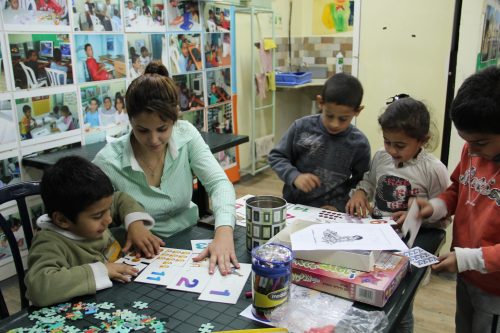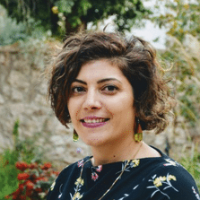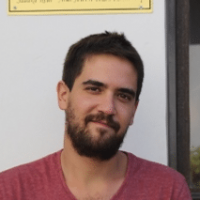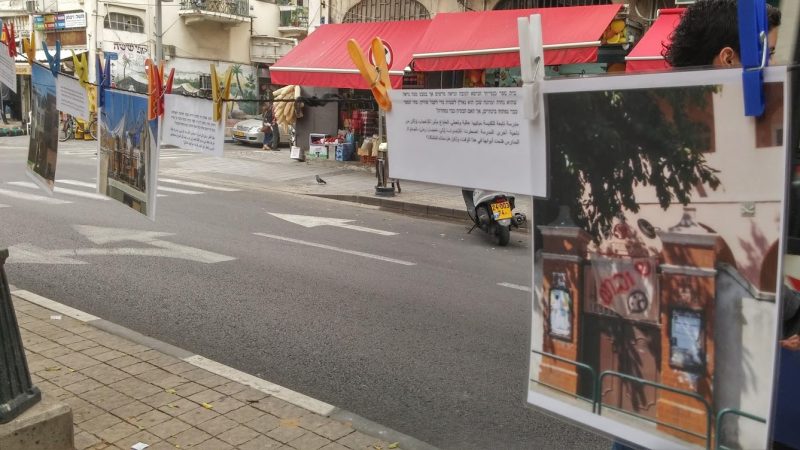Sadaka-Reut: Educating Toward a More Just and Equal Society
by Yigal Elhanan and Rawan Bisharat
Who We Are
Established in 1983, the not-for-profit Sadaka-Reut Arab-Jewish Youth Partnership (SR) seeks to address the deep-seated injustices caused by the Israeli-Palestinian conflict through our grassroots dialogue and leadership development programs. With a staff made up of both Arabs and Jews, we educate and empower Palestinian and Jewish youth in Israel to pursue social and political change through bi-national partnership in an effort to create a new generation of young activists promoting a shared society based on equality, solidarity, and justice.
Over the past decade, thousands of youth have taken part in our programs, and we have trained over a hundred facilitators who now use our approach as a tool for social change with hundreds of young people at Sadaka-Reut and other organizations. In addition, hundreds of our graduates are active in a variety of social change movements and organizations.
Sadaka-Reut’s Educational Model
Racism, injustice, and inequality are heavily entrenched within Israeli society across a variety of different communities and age groups. The goal of real and sustainable change for Palestinians and Jews alike therefore requires deep and meaningful educational activity.
Over the past two decades, Sadaka-Reut has been using a unique model in order to maximize our impact on Palestinian and Jewish communitieis and in order to reach new audiences to participate in our programs.The educational work in all of our projects is based on three main principles:
- Uni-national and Bi-national Settings: In order to promote a shared society, each group of Jewish and Palestinian participants first needs to recognize and address challenges within their own society and community. The uni-national setting provides a safe, open space where participants can discuss issues unique to their identity group. The bi-national setting provides a framework for the participants to meet “the other,” where they can become acquainted with their culture, opinions, and reality. Through this approach, we aim to promote young people’s belief in partnership and motivate them to utilise bi-national partnership as a tool for social change.
- Critical Education: In order to empower youth to become responsible social agents who understand the challenges of the society they live in, and are passionate about addressing those challenges, Sadaka-Reut endorses education as a tool for social change. With this in mind, we seek to instill in youth the knowledge and tools needed to examine their surroundings critically, and to challenge ongoing injustices and rigid conflict narratives. Re-examining and challenging the status quo empowers participants to suggest alternatives to the current political and social structures and help bring about a more just and equal reality.
- From Personal Transformation to Activism: Personal experience is the best way to learn and it is also crucial for cementing the attitudinal changes that participants go through over the course of the educational process at Sadaka-Reut. Therefore, the development and implementation of concrete social and political initiatives plays a vital role in all of Sadaka-Reut’s programming, instilling youth with confidence in their ability to be change-makers in society. Youth are trained to connect their personal and individual narratives with the social and political structures endemic to Israeli society. Our facilitators encourage youth to act locally within their communities and understand how the problems they encounter there are connected to the broader political context. This allows our participants to integrate the personal, social, and political aspects of their experience in a powerful, meaningful way.
Sadaka-Reut’s educational approach is based on our theory of change, which encompasses the entire transformational process that the participants go through. It begins on the individual-personal level, continues on the relational level as partnerships develop in shared spaces, and concludes on the cultural level, with participants widening the circles of influence as they carry forward the Sadaka-Reut model wherever they go in life – with their families, in their communities, and in wider social contexts.

Sadaka-Reut’s Projects and Educational Framework
Education is sometimes said to be a privilege reserved for youth and children. Sadaka-Reut disagrees. We believe that education is a never-ending process that does not stop once you reach a certain age. Therefore, Sadaka-Reut operates three main yearlong programs that differ according to the participants’ age and stage in life:
Building a Culture of Peace (BCP) is a youth-focused program that seeks to raise a generation of young people who are socially and politically conscious and involved in their local communities. Every year, some 500 Jewish and Palestinian youths, ages 14-17, participate in the BCP project. Most of the youth come from disadvantaged and socio-politically marginalized communities. The goal of the program is to encourage the youth to critically examine their reality, identify injustices, and initiate as well as participate in efforts to promote social and political change.
Community in Action (CIA) is a volunteering and leadership-development program for recent Palestinian and Jewish high school graduates as well as university students. Each year, the CIA program produces a bi-national cadre of young committed activists and leaders who have the tools, knowledge, and capacity to promote socio-political change towards a more just and equal society.
Partners in Shaping Reality (PSR) engages university students in dialogue and action groups. Providing a space for civic, political, and social discussions about the conflict and Jewish-Arab relations on campus, PSR encourages students to play an active, hands-on role and to be involved in changing the world around them, while giving them the skills needed to continue strengthening their voice once the program ends.
The Products of Bi-National Activism
Our belief in bi-national activism as a tool for change is manifested in the social initiatives that emerge from our various programs.
In recent years, participants in the Community in Action project have created a bi-national learning center and also initiated a campaign to disseminate information about the Palestinian history of the city of Jaffa. The campaign had a profound impact on participants, as they came to terms with their differing identities and gained a sense of self-worth.
In 2017, a Jewish youth group in Bat Yam (a city just south of Tel Aviv) taking part in the Building a Culture of Peace program created an initiative that connected participants’ personal experiences to the broader societal reality. The group, made up primarily of Jews of Ethiopian descent, had suffered from police discrimination and racial profiling for a long time. Led by their Sadaka-Reut facilitator, they designed and produced a sticker that reads “Officer, why did you detain me? My color is not reasonable grounds!” – implying that the reason they are frequently frisked, searched, and harassed by police has more to do with their skin tone than their actions.
Two years later, after a police officer killed 18-year-old Solomon Tekka, an Israeli citizen of Ethiopian descent, the local Ethiopian community initiated a day of protest. Sadaka-Reut staff joined the protest with “My color is not reasonable grounds!” stickers. One of the original group participants saw this on the news and wrote to tell us how proud she was that the sticker had been distributed in the demonstration.
These are just two examples taken from over three decades of Sadaka-Reut’s educational work. Stickers and consciousness-raising initiatives may seem small, but for our participants – some of whom go on to become facilitators and coordinators in Sadaka-Reut programs – they were meaningful experiences of initial success in their continuing journey as socio-political activists. We look forward to continuing our educational programs, which blend study with hands-on experience – a combination that enhances our participants’ ability to become active leaders of social struggles, while also instilling in them a long-term commitment to Arab-Jewish bi-national activism.
—

Rawan Bisharat is the Co-Executive Director of Sadaka-Reut

Yigal Elhanan is the Co-Coordinator of Sadaka-Reut’s “Community in Action” Project






Leave A Comment